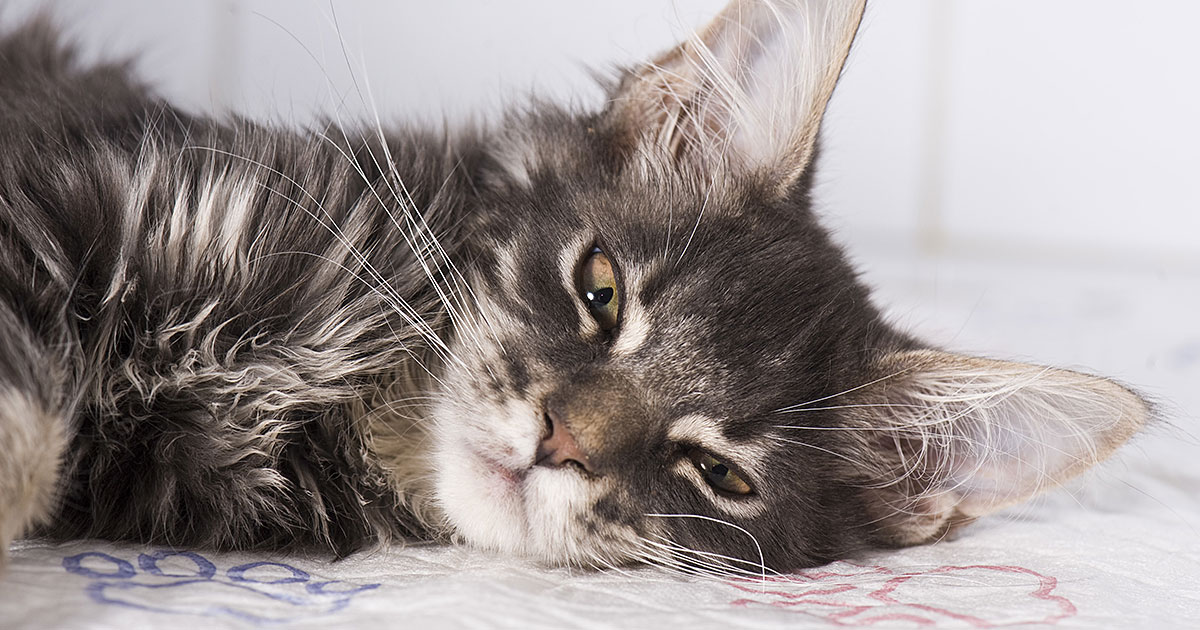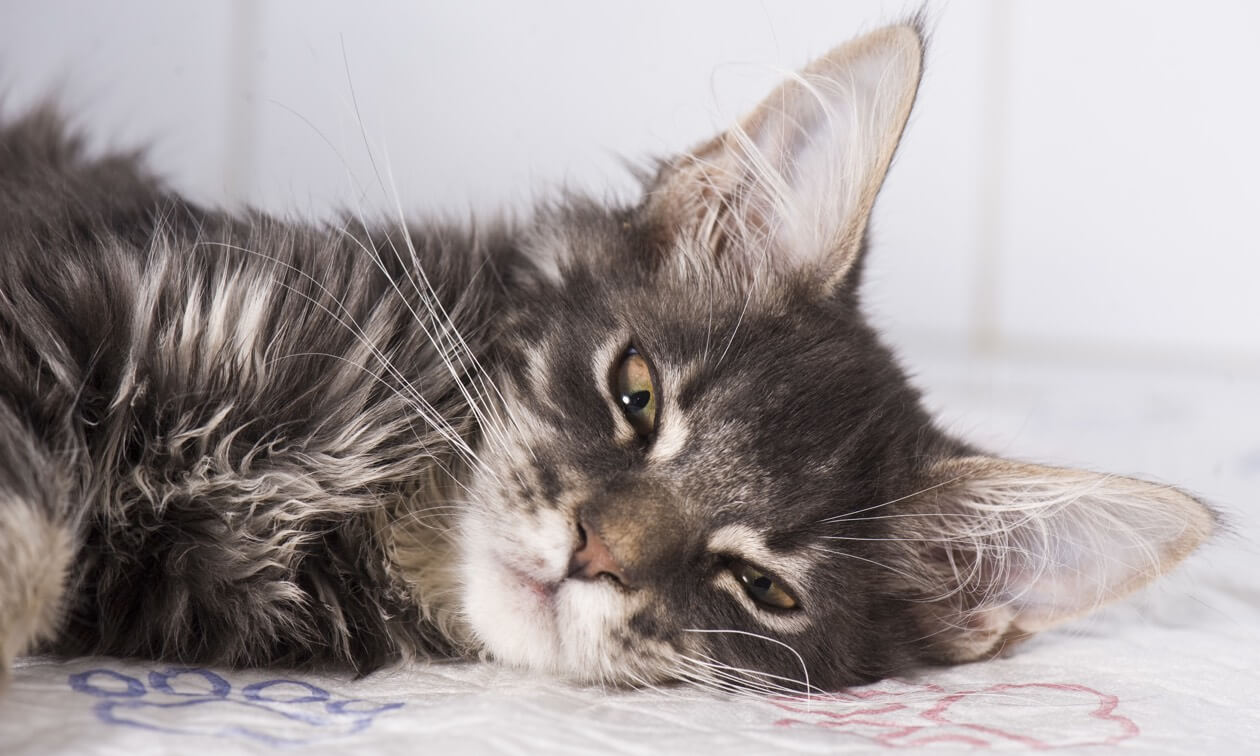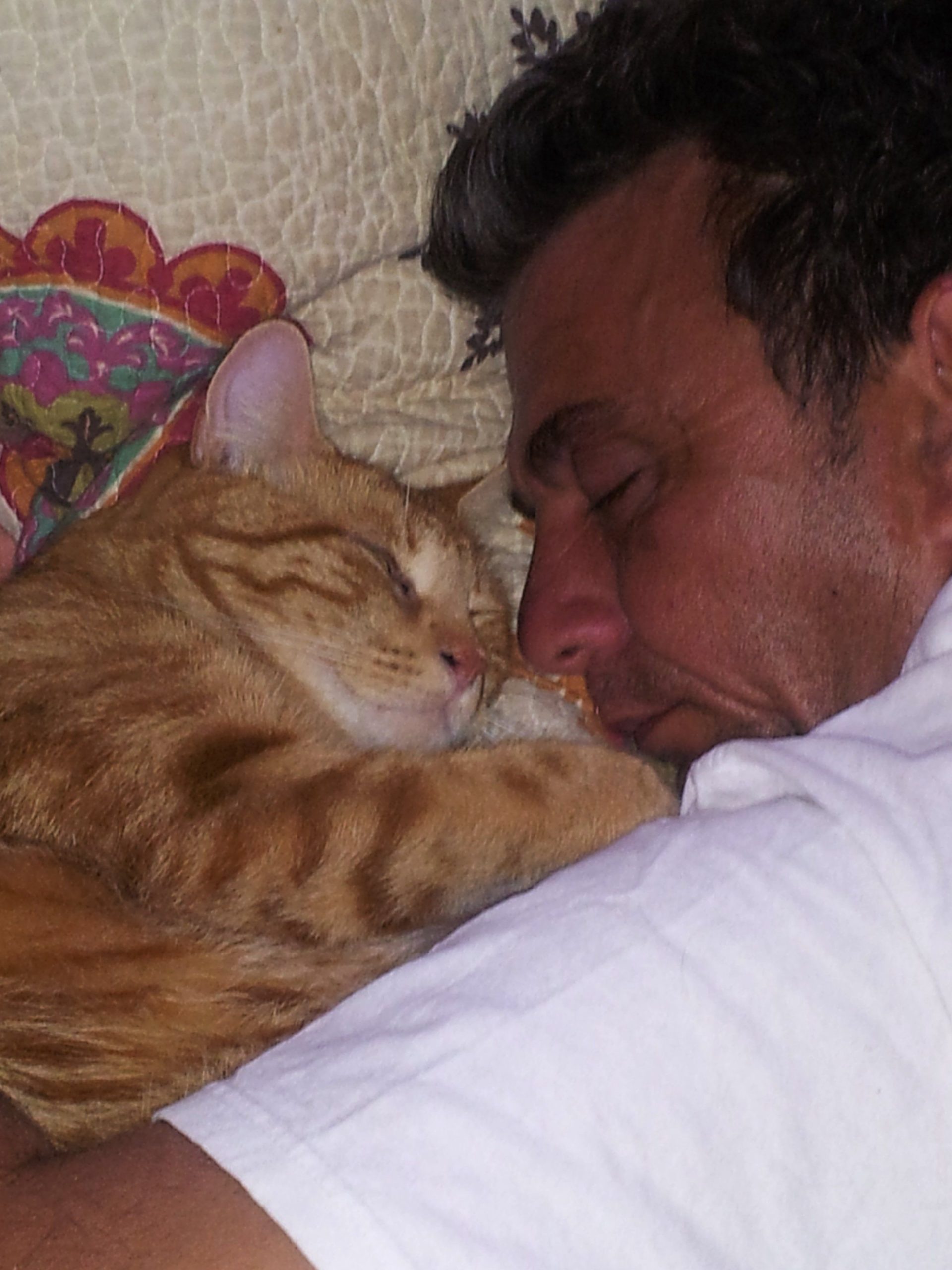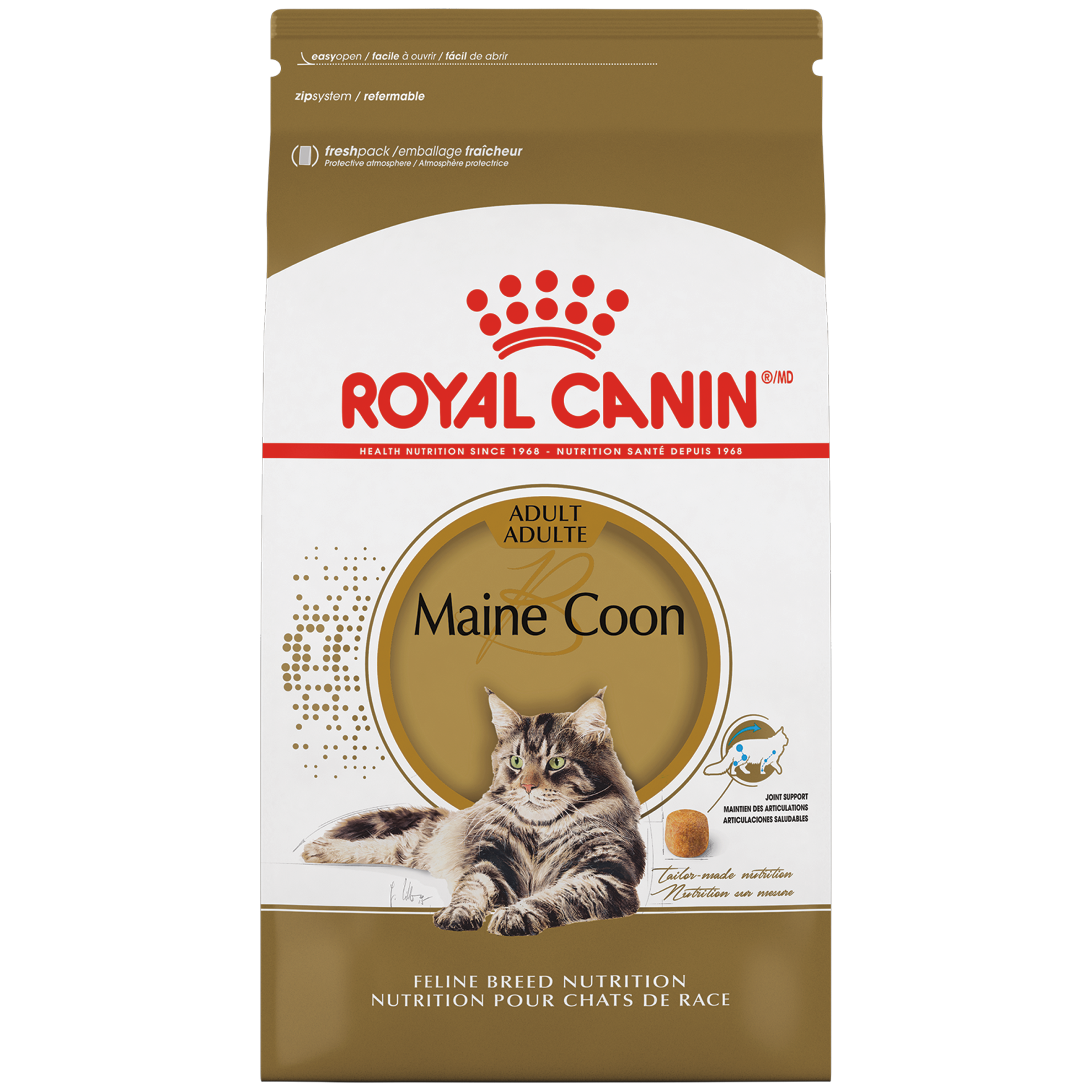Contents
- I. Introduction to Maine Coons and Vomiting
- II. Understanding the Reasons Behind Vomiting in Maine Coons
- III. Common Causes of Vomiting in Maine Coons
- IV. How to Help Your Maine Coon When It Throws Up
- V. Frequently Asked Questions about Vomiting in Maine Coons
- 1. Why do Maine Coons vomit?
- 2. Is it normal for Maine Coons to vomit occasionally?
- 3. How can I prevent hairballs in my Maine Coon?
- 4. Are there specific foods that can trigger vomiting in Maine Coons?
- 5. When should I be concerned about my Maine Coon’s vomiting?
- 6. Can stress or anxiety cause vomiting in Maine Coons?
- 7. What should I do if my Maine Coon vomits frequently?
- 8. Can I give my Maine Coon over-the-counter medication for vomiting?
I. Introduction to Maine Coons and Vomiting
Maine Coons are a popular breed of domestic cats known for their large size, muscular build, and friendly nature. They are often referred to as the “gentle giants” of the cat world. However, like any other cat breed, Maine Coons can experience health issues, including vomiting.
Vomiting is a common problem that many Maine Coon owners face. It can be distressing to see your beloved pet throwing up, and it may also indicate an underlying health issue that needs to be addressed. Understanding why Maine Coons vomit and how you can help them is crucial in providing them with the best care possible.
1. Causes of Vomiting in Maine Coons
There are several reasons why Maine Coons may vomit. It could be due to dietary indiscretion, where they have eaten something that doesn’t agree with their stomach. It could also be a result of a sudden change in their diet or the consumption of spoiled food.
In some cases, vomiting can be a symptom of a more serious health condition, such as gastrointestinal infections, pancreatitis, kidney disease, or even cancer. It is important to monitor your Maine Coon closely and seek veterinary attention if the vomiting persists or is accompanied by other worrying symptoms.
2. How to Help a Maine Coon with Vomiting
If your Maine Coon is vomiting occasionally and is otherwise healthy, there are a few things you can do to help them:
a. Monitor their diet: Ensure that your Maine Coon is eating a balanced and nutritious diet. Avoid giving them table scraps or foods that are known to cause digestive upsets in cats.
b. Provide fresh water: Make sure your Maine Coon has access to clean and fresh water at all times. Dehydration can worsen vomiting and other digestive issues.
c. Feed smaller, frequent meals: Instead of giving your Maine Coon large meals, divide their daily food intake into smaller, more frequent meals. This can help prevent overeating and reduce the likelihood of vomiting.
d. Reduce stress: Maine Coons are sensitive cats and can easily get stressed. Ensure they have a calm and comfortable environment, free from any triggers that may cause anxiety or stress.
e. Consult with a veterinarian: If your Maine Coon’s vomiting persists or is accompanied by other concerning symptoms such as weight loss, lethargy, or diarrhea, it is important to seek veterinary advice. A veterinarian can assess your cat’s overall health and conduct diagnostic tests if necessary to determine the underlying cause of the vomiting.
By paying attention to your Maine Coon’s diet, environment, and overall health, you can help reduce the frequency of vomiting episodes and improve their quality of life.
II. Understanding the Reasons Behind Vomiting in Maine Coons

Vomiting is a common issue that Maine Coon owners may encounter. While occasional vomiting can be normal for cats, frequent or persistent vomiting may indicate an underlying health problem. Understanding the reasons behind vomiting in Maine Coons can help you address the issue and provide the best care for your beloved feline friend.
1. Hairballs and Grooming Habits
Maine Coons have long, thick fur that requires regular grooming. While they are excellent self-groomers, their grooming habits can lead to the development of hairballs. Hairballs occur when your cat ingests excessive fur during grooming, which can cause irritation in the digestive tract and lead to vomiting. Regular brushing, providing a balanced diet, and using hairball prevention products can help reduce the occurrence of hairballs and vomiting.
2. Dietary Issues and Food Sensitivities
Diet plays a crucial role in your Maine Coon’s overall health. Certain foods, ingredients, or sudden dietary changes can trigger vomiting in cats, including Maine Coons. Some cats may have specific food sensitivities or allergies that can cause gastrointestinal problems. It’s important to feed your Maine Coon a high-quality, well-balanced diet that suits their nutritional needs and consult with a veterinarian for guidance if you suspect a dietary issue.
3. Gastrointestinal Disorders and Infections
Maine Coons are predisposed to certain gastrointestinal disorders, such as inflammatory bowel disease (IBD) or gastritis. These conditions can lead to chronic vomiting, diarrhea, and weight loss. Infections, such as viral or bacterial gastroenteritis, can also cause vomiting in Maine Coons. If your cat’s vomiting is persistent, accompanied by other symptoms like diarrhea or loss of appetite, it is crucial to seek veterinary attention for proper diagnosis and treatment.
4. Foreign Object Ingestion
Maine Coons are curious and playful by nature, which can sometimes lead to them swallowing foreign objects. Ingesting objects like toys, string, or even hair ties can cause gastrointestinal blockages, leading to vomiting. If you suspect your Maine Coon has ingested a foreign object, it is essential to contact your veterinarian immediately for proper evaluation and possible intervention.
5. Medications and Toxic Substances
Medications, houseplants, cleaning products, and certain human foods can be toxic to Maine Coons and cause vomiting. Some medications, especially those intended for human consumption, can have adverse effects on cats. It is crucial to keep all medications and potentially toxic substances out of your cat’s reach to prevent accidental ingestion and subsequent vomiting. If you suspect your Maine Coon has ingested a toxic substance, contact your veterinarian or a poison control hotline promptly.
By understanding the reasons behind vomiting in Maine Coons, you can take appropriate measures to prevent and address this issue. However, if your cat’s vomiting persists, worsens, or is accompanied by other concerning symptoms, it is crucial to consult with a veterinarian for a proper diagnosis and tailored treatment plan.
III. Common Causes of Vomiting in Maine Coons

Vomiting in Maine Coons can be caused by various factors. It is essential to understand the common causes to help mitigate the issue and ensure your beloved feline friend’s well-being. Here are some of the most prevalent reasons why Maine Coons experience vomiting:
Dietary Indiscretion
Maine Coons are known for their voracious appetite, and at times, they may indulge in eating things they shouldn’t. This can include consuming spoiled food, foreign objects, or even certain plants that are toxic to cats. When their digestive system reacts negatively to these substances, it can result in vomiting.
Allergies
Just like humans, Maine Coons can develop allergies to certain foods or environmental factors. When a cat ingests something they are allergic to, their body may respond by vomiting as a way to eliminate the allergen. Common allergens for Maine Coons include certain proteins, grains, or pollen.
Hairballs
Maine Coons have long, beautiful coats that require regular grooming. During self-grooming, they inevitably ingest a significant amount of loose hair. This hair can accumulate in their stomachs and form hairballs. When these hairballs become too large or obstruct the digestive tract, vomiting is a natural way for the cat to expel them.
Gastrointestinal Infections
Infections caused by viruses, bacteria, or parasites can also lead to vomiting in Maine Coons. Common culprits include feline distemper, salmonella, or intestinal worms. If your Maine Coon has been vomiting continuously, it is advisable to consult a veterinarian for proper diagnosis and treatment.
Medication Side Effects
Like any other pet, Maine Coons may require medication to treat various health conditions. Some medications can have side effects that include gastrointestinal disturbances, such as nausea and vomiting. If your Maine Coon has recently started a new medication and is experiencing vomiting, consult with your veterinarian about potential alternatives or adjustments.
Understanding the common causes of vomiting in Maine Coons is crucial for their overall health and well-being. By identifying the root cause, you can take appropriate measures to prevent or alleviate the issue. However, if the vomiting persists or is accompanied by other concerning symptoms, it is always recommended to seek professional veterinary advice.
IV. How to Help Your Maine Coon When It Throws Up

If your Maine Coon is experiencing frequent episodes of vomiting, it is essential to provide them with the necessary care and support. Here are some steps you can take to help your feline friend when they throw up:
1. Assess the Situation
When you notice your Maine Coon vomiting, try to determine the severity of the situation. Is it a one-time occurrence, or does it happen frequently? If it happens repeatedly or if there are any other concerning symptoms, it is advisable to consult a veterinarian.
2. Provide a Calm Environment
Maintaining a calm and quiet environment can help your Maine Coon relax after vomiting. Provide a comfortable resting place away from any potential stressors like noisy appliances or active children.
3. Limit Food and Water Intake
After your Maine Coon has thrown up, it is essential to give their digestive system a rest. Avoid offering them food or water for a few hours to allow their stomach to settle. Make sure they have access to fresh water once they have stopped vomiting.
4. Offer Small Meals
Once your Maine Coon’s vomiting has subsided, start reintroducing food slowly. Offer small, frequent meals throughout the day instead of large portions in one sitting. This will help avoid overloading their digestive system.
5. Choose Easily Digestible Food
Opt for easily digestible cat food specially formulated for sensitive stomachs. These diets are gentle on the digestive system and can help alleviate vomiting. Consult your veterinarian for suitable food recommendations for your Maine Coon.
6. Monitor for Allergies or Food Intolerances
Maine Coons, like other cats, can develop allergies or food intolerances. If you suspect that your cat’s vomiting is due to a specific ingredient in their diet, consider switching to a hypoallergenic or limited-ingredient cat food. Your veterinarian can guide you in choosing the right diet.
7. Prevent Hairballs
Maine Coons are known for their long, thick fur. Regular grooming and brushing can help minimize hair ingestion and the formation of hairballs. Use a cat brush or comb designed for long-haired breeds to remove loose hair and prevent excessive grooming and subsequent vomiting.
8. Keep an Eye on Your Maine Coon’s Behavior
Monitor your Maine Coon’s overall behavior, appetite, and litter box habits. Any changes in these areas may indicate an underlying health issue. If vomiting persists or is accompanied by other concerning symptoms like diarrhea, lethargy, or weight loss, seek veterinary attention as soon as possible.
Remember, while these tips can provide temporary relief for your Maine Coon’s vomiting, it is important to consult a veterinarian for a proper diagnosis and long-term management of the issue.
V. Frequently Asked Questions about Vomiting in Maine Coons

As a Maine Coon owner, it’s natural to have concerns about your beloved feline friend’s health. Vomiting in Maine Coons can be distressing, but it’s important to understand the reasons behind it and how you can help. Here are some frequently asked questions about vomiting in Maine Coons:
1. Why do Maine Coons vomit?
Maine Coons can vomit for various reasons, including dietary changes, hairballs, gastrointestinal issues, or even more serious conditions. It’s essential to identify the underlying cause to provide proper care.
2. Is it normal for Maine Coons to vomit occasionally?
Occasional vomiting may happen to any cat, including Maine Coons. However, if the vomiting becomes frequent or is accompanied by other concerning symptoms, it’s best to consult a veterinarian for a thorough examination.
3. How can I prevent hairballs in my Maine Coon?
Maine Coons are known for their long fur, making them more prone to hairballs. Regular grooming, including brushing, helps reduce hair ingestion. Additionally, providing a specialized hairball prevention diet or using hairball remedies can be beneficial.
4. Are there specific foods that can trigger vomiting in Maine Coons?
Each cat may have different food sensitivities or allergies. It’s important to observe your Maine Coon’s reaction to certain ingredients and consult with a veterinarian to find a suitable diet that minimizes the risk of vomiting.
5. When should I be concerned about my Maine Coon’s vomiting?
If your Maine Coon vomits frequently, has blood in the vomit, experiences weight loss, exhibits lethargy, or shows other signs of distress, it’s crucial to seek veterinary attention. These symptoms could indicate an underlying health issue that requires immediate care.
6. Can stress or anxiety cause vomiting in Maine Coons?
Yes, stress and anxiety can contribute to vomiting in Maine Coons. Cats are sensitive animals, and changes in their environment or routine can lead to stress-induced vomiting. Creating a calm and stable environment for your Maine Coon can help minimize this issue.
7. What should I do if my Maine Coon vomits frequently?
If your Maine Coon is vomiting frequently, it’s important to consult with a veterinarian. They can perform a thorough examination, conduct tests if necessary, and provide appropriate treatment options to alleviate the issue.
8. Can I give my Maine Coon over-the-counter medication for vomiting?
No, it’s not recommended to give over-the-counter medication to your Maine Coon without veterinary guidance. Some medications can be toxic to cats, and only a professional can determine the appropriate treatment based on the underlying cause of the vomiting.
Remember, understanding the reasons behind your Maine Coon’s vomiting and seeking proper veterinary care are crucial for their overall well-being. Consult with your veterinarian for personalized advice and guidance regarding your cat’s specific needs.

Jackson is an accomplished content writer with a flair for captivating storytelling. With a Bachelor’s degree in English Literature from the prestigious University of California, Berkeley, Hunter’s educational background has honed his writing skills to perfection. His love for felines is evident in his extensive knowledge of cat behavior and care, making him an expert in the field. Hunter’s passion for cats has led him to contribute insightful articles to various online platforms, providing valuable information and tips to cat owners worldwide. With his exceptional writing abilities and deep understanding of cats, Hunter continues to create engaging content that resonates with readers and leaves a lasting impact.

